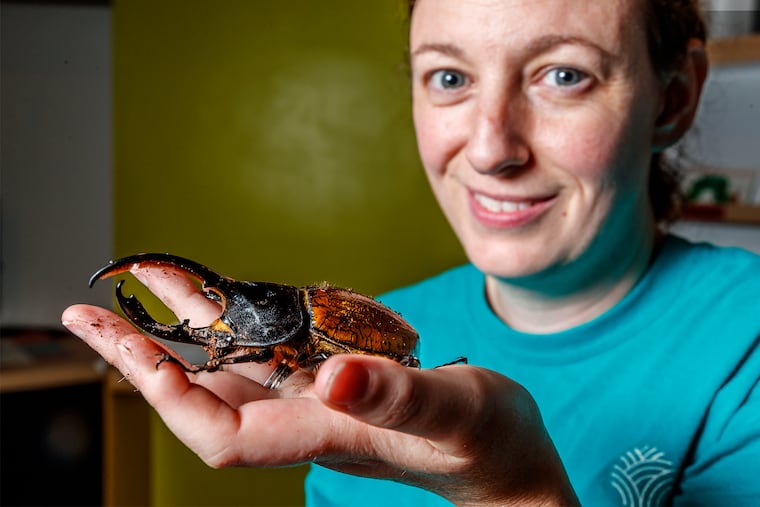Philly insect museum heist reveals bugs are hot items on black market
The theft of live bugs from the Philadelphia Insectarium came several days after the arrest of a New Jersey man on charges of smuggling scorpions.

Karen Verderame, who takes care of live insects and spiders at the Academy of Natural Sciences of Drexel University, got the call from the security desk:
"Somebody dropped off these beetles," the guard told her one day a few years ago. "Do you want to come down and take them?"
They were not just any beetles. Upon opening the lid of the container, Verderame gaped at a pair of female Dynastes hercules, each more than 4 inches long, native to South America, and illegal to own without a special permit from the U.S. Department of Agriculture. Also in the box: a dozen tiny, white, spherical eggs.
The beetle donors were gone from the museum by the time Verderame went to the security desk to investigate. But she has little doubt that, even if the mystery visitors had the best of intentions, the insects they delivered had originated on the black market.
Giant beetles, tarantulas, scorpions, and other crawly creatures are big business, sought after by collectors who pay hundreds of dollars for certain specimens — an enduring fascination that allegedly fueled two recent criminal enterprises.
On Aug. 18, federal prosecutors arrested a Metuchen, N.J., man on charges of smuggling protected scorpions and giant millipedes to this country from Tanzania — a case that began when a startled U.S. postal employee discovered some of the critters loose inside a mail truck, escaped from their parcel.
A few days later, thousands of bugs, lizards, and other beasts were stolen from the Philadelphia Insectarium and Butterfly Pavilion, a museum on Frankford Avenue. Police said at least three current or former employees are suspects in the theft of the items, with an estimated value of more than $40,000. As of Friday, no arrests had been made and the specimens had not been recovered.
There have been no such issues at the Academy of Natural Sciences of Drexel University, but Verderame, an invertebrate specialist, said she and her colleagues at the redbrick museum are keenly aware of how creature trafficking can wreak havoc on the environment.
In the case of the mystery beetles at the security desk, she contacted federal agriculture officials to get the insects added to the museum's official permit. That type of authorization is granted to institutions that demonstrate they have the proper facilities and know-how to care for exotic beings.
"The USDA representative was very happy we had them," she said. "There was one pair less out there in the field."
At hobby shows and on websites where insects, spiders, and other beasts are sold, plenty of the species are legit. But some of them, perhaps exchanged in transactions after a show has closed for the day, are not — either because the seller or purchaser lacks the proper permit, or because the creature is threatened in the wild and thus protected by international agreement. In some cases, the buyers are unaware they are breaking the law, Verderame said.
The critter trade poses several risks, she said. If non-native creatures get loose, they could multiply unchecked if the conditions are right, threatening native plants and animals. On the flip side, the environment where the creatures were taken from — a rain forest, say — can suffer.
The trade in such creatures has been around for years, she said.
"Sometimes it's almost like an ego thing," she said. "As in, 'Can I have this really cool animal?' "
In some Asian countries, certain beetle species are prized for their fighting ability and pitted against one another.
There is no telling why the Hercules beetles were left at the Academy of Natural Sciences a few years ago. Perhaps the owner could not find a buyer, as the females command a lower price than their horned male counterparts. Or maybe the donor simply lost interest.
The natural history museum was not equipped to hatch the eggs, so those were sent to another facility. But the beetles were a welcome addition, used in educational programs until they died a few months later.